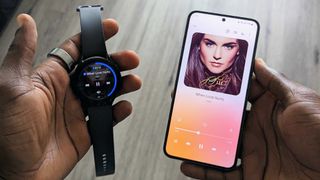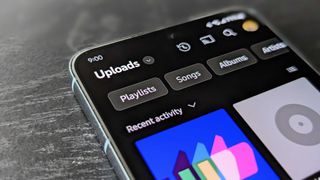Donations Make us online
YouTube Music may not be perfect, but the app has a lot going for it. As far as music streaming apps go, I actually prefer it to the others. That said, I normally don’t default to streaming music; I generally prefer to listen to my own music files that I’ve collected over the years. I’m no audiophile or anything, it’s just how I prefer to listen to music most of the time.
That leads me to one of the biggest annoyances with YouTube Music: its seeming inability to read device audio files. The app even has a section in the library dedicated to device files, but opening it takes forever to load, and actually trying to use it is even worse. Try to play a track, you’re waiting at least 25 seconds for it to start, a total of 45 for the song information to actually load, and don’t even think about trying to skip to another song unless you want to find yourself sitting in another awkward silence as it tries to load.
This normally isn’t something I really have to deal with, having stuck to LG and Samsung phones throughout the years. These companies ship built-in music players with their versions of Android, which has been incredibly convenient. The thing is, not every Android OEM does this, and that’s usually where I run into problems.
I’ve reviewed a number of phones over the past few years, and oftentimes, my biggest annoyance is that they can’t play my music files because they don’t come with an app that can do it well. Even when reviewing the Pixel 7, I’d get annoyed at its lack of a music player other than YouTube Music.
I don’t remember ever having this problem when Google Play Music was around, as it would play my local device files with relative ease. This is why it was so shocking to me when I realized just how consistently bad YouTube Music is at this.
Fortunately, there are a number of music players you can download from the Play Store. Spotify, possibly the most popular music streaming service, is actually pretty great at playing local files. Unfortunately, many other apps are paid or require a paid subscription for access to certain features. However, while YouTube Music absolutely sucks at playing device files, it does have one card up its sleeve that can help get you past that.
YouTube Music has a section that’s dedicated to your device files, but it’s pretty useless.
With YouTube Music, you can upload your music files to the service and access them that way. You have to use the website to upload, and you’re limited to a mere 100,000 tracks, but when it’s done, it works very well. Tracks play as if they’re streaming directly from the app, which, in essence, they are.
This makes it possible to access your tracks from almost any device with YouTube Music installed, which comes in handy for someone like me who is constantly switching phones. Plus, it allows you to cast the songs to other Assistant smart speakers and add songs to your streaming queue.
Given Google’s focus on streaming content, it makes some sense it would resort to this method. However, there are some downsides, such as the fact that any new audio files you collect will have to be manually uploaded, which just adds another step to the entire process. It also means you will have to rely on an internet connection to play your songs, which kind of defeats the point of playing your device files. That said, you can still download the tracks for offline listening.
It’s not like this is some new feature, and to my knowledge, this has been available for some time on YouTube Music and even back when it was Google Play Music. However, it’s a feature I only recently discovered after quite a bit of frustration with the app. After all, I mainly stick to Samsung Music for my tunes, so I’ve rarely had to go looking too deep into YouTube Music for a viable way to play my music.
Still, while YouTube Music shouldn’t be this bad at playing device files, I feel like allowing users to upload their files for easy access from any device is a nice alternative and underrated feature.
Source link









Leave a Reply